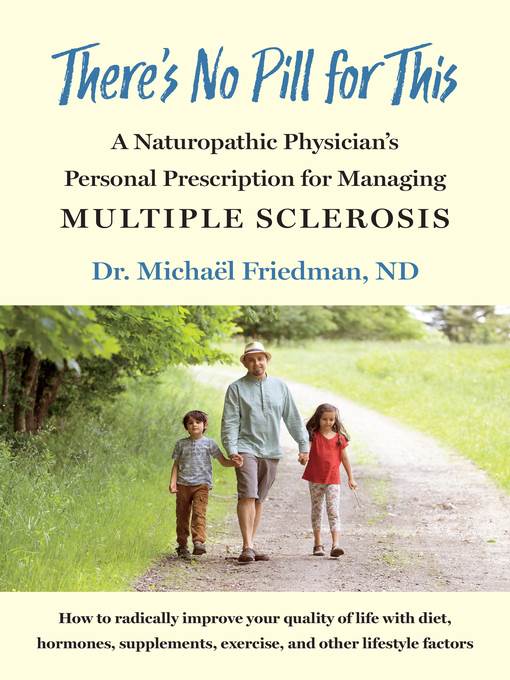From a doctor living with MS: how to radically improve your quality of life with diet, hormones, supplements, exercise, and other lifestyle adjustments Most of us take for granted the little things in life like walking out to the mailbox, socializing with friends, or enjoying a mug of hot coffee. But what if each daily activity required intensive planning and effort? That's what living with multiple sclerosis is like, and author Michaël Friedman knows this from first-hand experience. Since his diagnosis of multiple sclerosis a decade ago, Dr. Friedman has been searching for a cure for the disease. After years of research, he realized that he had some of the answers right in his naturopathic medicine toolbox, and others, surprisingly, lay in the realm of conventional medicine. There's No Pill for This tells his story and offers treatment advice and hope to those who suffer from MS. He does not promise a miracle cure but instead provides the personal prescriptions he follows that are delaying the disease process and radically improving his quality of life, including dietary measures and supplements to support a healthy microbiome and hormone therapies that can reduce neuroinflammation and possibly promote neurorestoration. Dr. Friedman presents a daily protocol for MS patients, including diet, supplement, detoxification, and hormone strategies; mindfulness therapy; physical therapy; and a wide range of beneficial lifestyle adjustments related to exercise, sleep routines, time management, stress management, and more. He also offers special advice for supporting healthy bladder and bowel function and improving oxygen supply. In the book's conclusion, Dr. Friedman reflects on what this complicated chronic disease has taught him, and continues to teach him, about the value of humility and about what is truly important in life.

October 1, 2020
Around a million people in the United States today are living with multiple sclerosis (MS), an autoimmune-mediated disease in which the body's immune system attacks the body's myelin in the central nervous system. MS can cause fatigue; weakness; walking difficulties; numbness or tingling; stiffness and involuntary muscle spasms; vision, bladder, and bowel problems; and cognitive changes. Friedman is a naturopathic physician who was officially diagnosed with relapsing-remitting MS (the most common form of MS, which affects 85 percent of patients) in 2009, and has spent a lot of time since then investigating how he and his patients can better manage their MS and improve the quality of their lives with naturopathic treatments--vitamins, minerals, hormones, herbal remedies; exercise and diet; stress reduction--in addition to traditional medical advice and treatment. He also touches on women's issues, including pregnancy and menopause, and how the condition affects both, as well as common topics such as stress, depression, and more. The book concludes with a FAQ. VERDICT An open, honest, and up-to-date guide, based on personal experience in addition to science, for people living with MS along with their caregivers.--Marcia G. Welsh, former with Dartmouth Coll. Lib., Hanover, NH
Copyright 2020 Library Journal, LLC Used with permission.



























دیدگاه کاربران